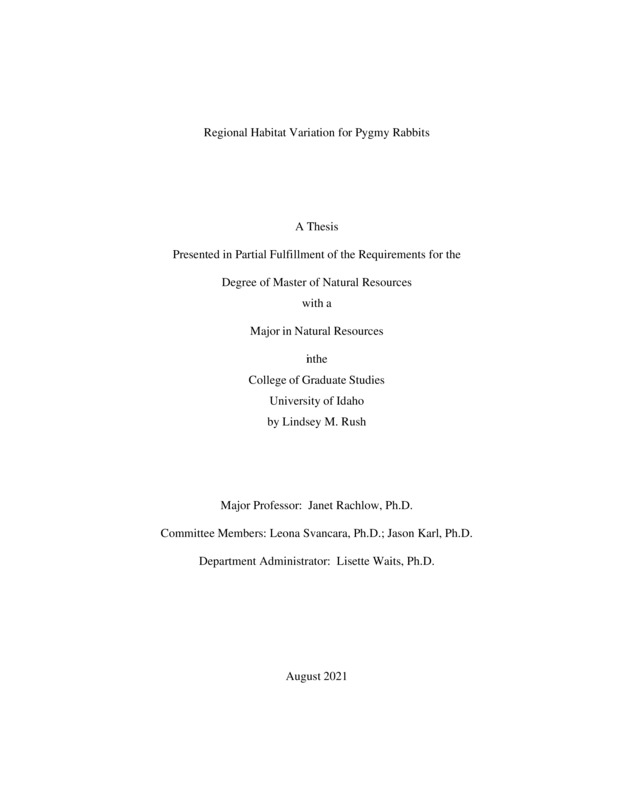Regional Habitat Variation for Pygmy Rabbits
Rush, Lindsey M. (2021-08). Regional Habitat Variation for Pygmy Rabbits. Theses and Dissertations Collection, University of Idaho Library Digital Collections. https://www.lib.uidaho.edu/digital/etd/items/rush_idaho_0089n_12157.html
- Title:
- Regional Habitat Variation for Pygmy Rabbits
- Author:
- Rush, Lindsey M
- ORCID:
- 0000-0001-8125-1802
- Date:
- 2021-08
- Keywords:
- bioclimatic habitat specialist Maxent pygmy rabbit sagebrush species distribution models
- Program:
- Natural Resources
- Subject Category:
- Wildlife conservation; Ecology; Wildlife management
- Abstract:
-
The pygmy rabbit (Brachylagus idahoensis) is a sensitive species endemic to the sagebrush steppe ecosystem of the western USA. As ecosystem engineers and sagebrush obligates, pygmy rabbits and their connection to sagebrush have made the species fascinating to study. In Idaho, federal and state agencies are currently focusing on conservation and restoration of sagebrush habitats, and for certain species like pygmy rabbits, information about their distribution and habitat relationships is incomplete. Sagebrush habitats available to pygmy rabbits across their range are diverse, and a better understanding of the characteristics that influence their presence is necessary for future conservation actions. This thesis investigates how habitat relationships of pygmy rabbits differ across five ecological regions in Idaho and how certain environmental characteristics influence habitat suitability. We modeled predicted species distribution for five distinct ecological regions in Idaho, identifying environmental characteristics that influence suitable habitat for the species, while also identifying areas of predicted suitable habitat within each region. We created inductive species distribution models (SDMs) using maximum entropy methods that included a suite of environmental predictor variables representing topography, vegetation, climate, and soil characteristics. Results of the regional models identified substantial variation in habitat associations across the five regions, with each retaining a unique set of environmental predictors. Bioclimatic variables were the most influential environmental parameters in all five regions, but the specific variables differed among all regions. The models that were developed at regional extents predicted smaller areas of habitat (an average of 15% less for suitable habitat and 80% less for primary habitat) than predictions generated from a model developed at the extent of the entire range of the species. Lastly, we projected the regional models using future climate scenarios to explore how future climate conditions might affect predicted suitable habitat for pygmy rabbits. Significant reductions in suitable habitat were projected across the study area, but variation among regions also was apparent. Although these projections should be interpreted with caution, they suggest that climate-driven changes in the environment could have large and varying effects on persistence of habitat for pygmy rabbits in Idaho.
- Description:
- masters, M.S., Natural Resources -- University of Idaho - College of Graduate Studies, 2021-08
- Major Professor:
- Rachlow, Janet L
- Committee:
- Svancara, Leona K; Karl, Jason W
- Defense Date:
- 2021-08
- Identifier:
- Rush_idaho_0089N_12157
- Type:
- Text
- Format Original:
- Format:
- application/pdf
- Rights:
- In Copyright - Educational Use Permitted. For more information, please contact University of Idaho Library Special Collections and Archives Department at libspec@uidaho.edu.
- Standardized Rights:
- http://rightsstatements.org/vocab/InC-EDU/1.0/

